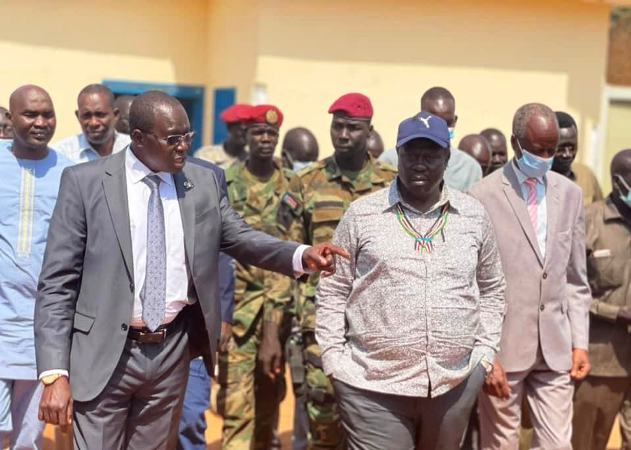Juba, Khartoum agrees to form border monitoring committee
February 23, 2022 (AWEIL) – South Sudan and Sudan have agreed to form a high-level committee to monitor cross border attacks between local communities, winning the support of local leaders.
Northern Bahr El Ghazal State Governor Tong Akeen Ngor said Wednesday the Vice President for Service Cluster had informed him and members of his cabinet of a discussion he had with the Sudanese Deputy Chairman of the Sovereign Council about a need to form a high-level border monitoring committee.
The committee will be tasked with identifying and tracking activities of illegal along the border.
“That’s right. You remember the Vice President was here last week. He had come on an official visit. One of the reasons he was here was to assess (the situation) before briefing His Excellency the President of the Republic on the prevailing security and economic situation,”
“As for us in Northern Bahr El Ghazal state, our security situation is calm except at the border with Sudan,” Ngor said.
The governor was referring to clashes that erupt regularly in the border areas over the sharing of natural resources between pastoralists groups coming from Sudan and the Luo and Dinka Malual farmers.
He approved the idea of the joint committee adding that it will be formed when consultations are completed.
The top state official, however, underscored that the joint committee will not be a border demarcation committee.
“It is a border monitoring committee which would be responsible for monitoring, identifying, and tracking activities of the criminals”, he said.
The matter was discussed during a meeting held in Juba between Vice-President Hussein Abdelbagi Akol Agany and the Sovereign Council Deputy Chairman Mohamed Hamd Daglo Hemetti who was in the capital for talks over the implementation of the revitalized peace agreement.
Traditional leaderships and local authorities at the border areas in Northern Bahr El Ghazal have welcomed the decision of the two sides to form a high-level border monitoring committee.
It remains, however, unclear who would be on the committee on both sides.
Local border experts prefer expansion of the committee to include tribal chiefs, members of the armed forces, security operatives, and police services on both sides.
Their involvement would help in the monitoring, identifying, and tracking of people involved in illegal activities across the border areas.
(ST)

